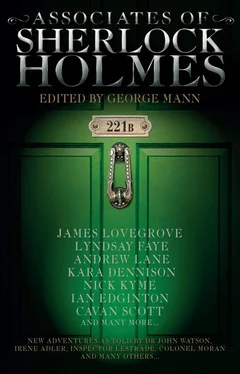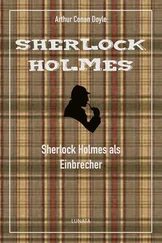Whereas you or I might perhaps have taken the lady into our confidence, given that this was a matter of murder, the vanity of my brother, which knows no bounds of good taste nor any check to his actions, led him to proceed to burglarise the lady’s boudoir in order to extract a lover’s keepsake which he then went on to render down to its constituent parts and subject to minute chemical analysis.
The spectacle of my brother, diligently teasing apart tufts of a man’s whiskers and boiling them in a variety of reagents is, I confess, an amusing one – and I must not let it deflect my mind from the fact that this was – and remains – a very brutal crime. Nevertheless, albeit grimly, I am inclined to smile at the mental image. Even Watson – I have little doubt – must have chided him for this graceless action, the more so because it availed nothing in terms of practical proof.
The theory was sound – something must have caused Rourke to lie unmoving while the hail of shot let out his life, and the absence of wounds at the wrists and ankles spoke against any physical restraint. Although the hair proved nothing either way as to poison, it might have been removed by an extremely careful assassin as a precaution. More likely though it spoke of a poison that required only a single dose, rather than a gradual building up of toxicity in the body. I do not share my brother’s interest in the minutia of murder, but any classicist must have been struck by the possibility of hemlock, and Sherlock considered the most likely poisonous agent to be conium maculatum – the poison which, in legend at least, was imbibed by Socrates. Hemlock tea can be given as a pleasantly tasting tisane – easily pressed upon a teetotaller. Its action is mild, and its predominant effect short of death is of a complete muscular paralysis. Under its influence, a victim – even if he had not in fact ingested a sufficiency to die – might well prove unable to stir a muscle to save himself from the slow drop, drop, drop of the fatal metal. Though unproven, my brother (and I) considered such a drug to be the likely means by which the victim was rendered helpless.
You’re right; I did mention a third theory, other than disguise, or the removal of evidence, which might account for the removal of the sideburns and moustache.
The third theory – though it had occurred to him – was not one that my brother felt able to pursue, involving as it did an emotional question of a certain delicacy. This task he forced upon Watson, despite the fact that Sherlock had rendered it almost impossible by his own felonious actions. The task was simply to interview Sergeant Rourke’s innamorata Miss Athol and ascertain whether or not his moustache and sideburns formed an impediment to their union, or were among his chief attractions. If the former, a simple chain of reasoning existed: learning of some improvement in his fortunes, the sergeant might well have been emboldened to propose – intending to do so he would have made the personal sacrifices necessary to present himself in the most aesthetically pleasing state. I am not myself much inclined to the pursuit of the fair sex – a man my size must be most enamoured of the pleasures of the table – but surely such an act as appearing clean shaven would charm an already interested party, who had professed a disquiet in connection with his appearance, almost as much as his increased financial prospects. The murder, and the mutilation of the moustache would then be either coincidences, or, if related, would be related by a causal chain in which both were set in motion by the letter, but without being themselves connected. Alternatively, if she especially favoured his appearance unaltered, then the change wrought upon it might represent a coup carried out by a rival, or unsuccessful suitor, with the murder in that model of events being again a parallel event, unless it – in itself – formed part of the spurned lover’s revenge.
Watson was – for he possesses an excellent bedside manner and all the graces of a confiding physician – able to gain the young woman’s confidences, as Sherlock would not have done. She did indeed have a previously favoured man, a George Welby, who had been pressing his suite upon her for some time, but whom she had rejected when he proved to be a habitual taker of spirituous liquors. He had attempted to conceal this from her, and indeed may have been inclined at one point to attempt to set drink aside and follow her example, but he had the misfortune (as it seemed) to be taken up by new friends and in their company so to wallow in the dens of the City, so that it could not but come to her attention. Her view of the sergeant’s moustache and sideburns was more than favourable, it seemed. It was one of a doting mother to a boy’s first facial hair. She approved of them heartily as a sign of a virile manliness which did not require gin to set it going, nor brandy to sustain it.
This I think Sherlock should have been able to deduce without Watson’s evidence – for no-one of professing an opposing view would have wished for or, having been given unwished, cherished the form of keepsake that he had earlier stolen. I confess I do not know how Holmes and Watson resolved the matter of this theft; I imagine the surreptitious re-stuffing of the bag by Holmes with some hair from a recently deceased scoundrel in police custody, and its replacement under her pillow with some embarrassment by the comfort-bearing Watson. But perhaps, after all, she did not miss it. I hesitate to conjecture about female sensibilities.
See how maddeningly my brother flounders between ideas, each one setting him on some active foray into events, when a cautious rational picture built up from item upon item of data would serve his turn so much more effectively. You can, I suppose, conclude his next step?
Quite so. Learning that the suitor Welby – now his main suspect – was prone to drink and consorted with bad companions, he began a wholesale haunting of public houses and traveller’s inns, his lean body bulked up with cloth to a drunkard’s dimensions and his nose reddened with rouge. Ah, what it is to be the brother of a thwarted thespian. I’d wager your own brother gave you no such trouble, personally, being a mathematician – the mildest and gentlest of professions, next to your own railway work. [9] Colonel James Moriarty, though formerly in the Indian Army, was at this time employed as a railway station master. That his brother had the same name as him must have been confusing, but it is possible that they were referred to as James Senior and James Junior respectively, by a father more than usually obsessed with order and regimentation.
Thus a whole three days of time were lost, clapping men upon the back and exclaiming about this or that sporting endeavour, until Sherlock – under the barbarous name of Philip Matherhyde – was quite as boon a companion to Mr Welby as any of that young man’s new friends. A telegram, meanwhile, had gone to Sergeant Rourke’s relatives to discover if the mysterious message that had cheered him had originated with them, or if they could raise a conjecture as to its sender. A reply reached Baker Street by the same means, while Holmes was among his cups. The letter had not directly concerned a legacy, but it had been a turn of fortune, which might suggest to the sergeant that the time had come to actively pursue the hand of Miss Athol. The message was nothing less than the news of the death of his estranged wife, an Indian woman – whom he had abandoned on his return to England. It is perhaps surprising that a man who would readily abandon one wife might feel a qualm in seeking to court another – but Rourke’s family were Irish Catholic stock, and, whereas the leaving of a native bride was accounted a venal sin, the bigamous or adulterous acquisition of another or the horror of divorce were both to him as much an evil as the bottled demons that he attempted to wrest from the hands of his soldiers. Considering himself free, however, he had undoubtedly gone to his death in the pleasant, if deluded, mental state of one contemplating the bliss of matrimony.
Читать дальше












